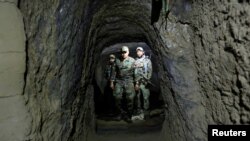Militants from the so-called Islamic State group are losing their stronghold in Afghanistan’s eastern Nangarhar province, but the terror group is trying to expand to adjacent regions of the country, according to an Afghan lawmaker.
“IS has deployed around 2,000 militants in Kunar, Nuristan and Laghman provinces, where they have started carrying out militant activities,” Hazrat Ali told VOA's Afghan service. Ali represents eastern Nangarhar province which borders all three provinces.
The lawmaker told VOA that most of the IS fighters leaving Nangarhar for the adjacent provinces are foreign nationals.
Until now, most of Islamic State's activities in Afghanistan have been in Nangarhar, but the extremists now have established a persistent presence in mountainous parts of Kunar and Nuristan provinces, local authorities said.
“IS is active in several districts in Kunar,” the provincial police chief, Juma Gul Hemmat, told VOA. “The group runs a training base in the Patash valley, where foreign members of IS, including Arabs and Pakistanis, train new fighters and recruits.”
IS operations in eastern Afghanistan, which the group calls Khorasan Province after a traditional name for the region, emerged early in 2015 in rugged parts of Afghanistan and Pakistan. Since then Islamic State has been active mainly in Nangarhar, where its fighters targeted villages in several provincial districts, killing and abducting hundreds of people and setting homes on fire.
The terror group has also been active in northern Jouzjan and Sar-e-Pul provinces, where it fought heavy battles with Afghan security forces and with the rival Taliban group.
Afghan and U.S. forces have carried out counterterrorism operations together against IS in eastern Afghanistan as part of their joint goal of eliminating Islamic State in Afghanistan this year. Hundreds of IS fighters, including several senior commanders, have been killed in recent months.
Abu Sayed, the group’s top leader in Afghanistan, was killed in a U.S. airstrike last month. Sayed was the second Islamic State leader in the past four months, and third in the past year, to have been targeted. His tenure was brief: Sayed took over as IS leader in the country in late spring, after the death of Abdul Hasib, his predecessor, who was killed in a U.S.-Afghan security forces raid in Nangarhar's Achin district.
Kunar police chief Hemmat told the Afghan Pajhwok news agency that a drone strike late Sunday killed three IS members, including Abdul Majid, who was in charge of the terror group’s prisoners’ affairs. The strike was not immediately confirmed by U.S. authorities.
Despite its many setbacks, Islamic State has claimed responsibility several recent suicide attacks in major Afghan cities, including the capital, Kabul.
IS said its fighters stormed Iraq’s embassy in Kabul last month, and also were behind a suicide attack on a Shi'ite mosque in western Herat province that killed at least 29 worshippers and wounded 40 others.




